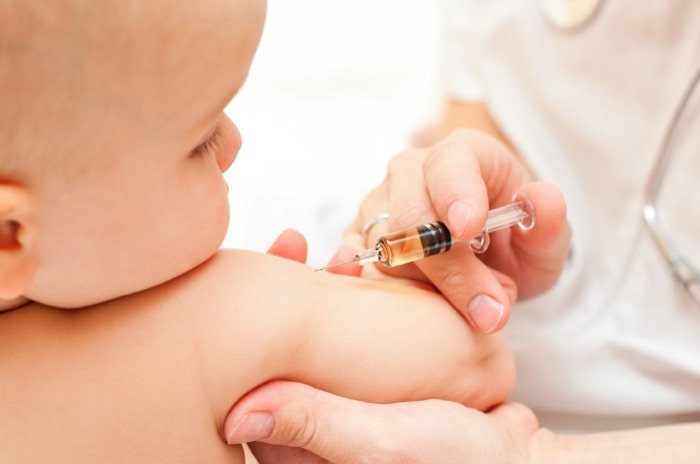Contents:
- Medical Video: The HPV Vaccine | Why Parents Really Choose to Refuse
- Why is baby immunization important?
- Baby immunization schedule is mandatory in Indonesia
- 1. Hepatitis B
- 2. Polio
- 3. BCG
- 4. DPT
- 5. Measles
- List of additional child immunizations that can also be given
- What if late infant immunization is done?
- What if the baby is not immunized at all?
- Be aware of various side effects of child immunization
- 1. Pain, swelling and redness in the area injected
- 4. Symptoms like wanting to get the flu
Medical Video: The HPV Vaccine | Why Parents Really Choose to Refuse
Has your child received complete immunization? Infant immunization is an important thing that must be given to your child after he is born. The reason is, this procedure is useful to prevent children from getting infections in the future.
Unfortunately, there are still many parents who are hesitant to immunize babies because they are afraid of having sick children afterwards. As a result, babies don't get the vaccine they need. So why is infant immunization important and what is the impact if the child is not immunized? See the full review in this article.
Why is baby immunization important?
Actually, children have the ability to protect themselves from viruses and bacteria since he was still in the womb. This is because antibody-forming cells, B cells and T cells, have been formed since 14 weeks of gestation and continue to develop in the first year of birth.
Even so, the baby's immune system is not as strong as an adult's immune system. Because, antibodies originating from the mother's body will experience a passive decline during the first few months. As a result, babies are very susceptible to disease because the body's immune system has not yet formed.
By doing baby immunization, it means you protect your baby from various diseases in the future. Yes, vaccines injected into your child's body will help the child's immune system to form antibodies, which function to fight viruses or bacteria that enter the body. Well, this is what can prevent children from being exposed to various types of dangerous diseases.
Furthermore, this procedure can also save your child's life. In ancient times, many children suffered pain such as polio, and the disease caused many children to die. With the advancement of science and technology, vaccines were created to eradicate the disease and as a result there are now fewer children suffering from dangerous diseases.
However, that is not the only reason why you should bring your child to be immunized. There are three important reasons why infant immunization is required:
- This procedure is fast, safe, and very effective.
- Once your child is immunized, the child's body can fight the disease better.
- If the child is not immunized, the child will have a higher risk of getting a disease that can cause disability, even death.
Baby immunization schedule is mandatory in Indonesia
In Indonesia, every baby under one year must get complete basic immunization. This immunization is useful for preventing babies from getting polio, measles, tuberculosis (TB), diphtheria, pertussis or whooping cough, tetanus, and hepatitis B.
Mandatory immunization must be given according to the type of vaccine and the immunization schedule specified in the Immunization Guidelines (PPI) and provided free of charge, or free. The method is easy. Just come to the health service center in the government, for example a government hospital, posyandu, and puskesmas. Here is a complete list of basic munizations that parents should know:
1. Hepatitis B
The provision of immunization for children is intended to ward off liver infections due to hepatitis B virus from mother to child during the birth process. This is important because hepatitis B infection can cause liver cancer and cirrhosis.
This immunization schedule is given three times. First, in less than 24 hours after the baby is born. Then administration of the vaccine continues when the baby is 1 month old. After that it is given when the baby's age range is 3 to 6 months.
2. Polio
Polio or also known as wilt paralysis is one of the infectious diseases caused by viruses in the digestive tract and throat. Once your child has this disease in his feet and / or hands, there is no cure for it. Even sometimes it can cause respiratory muscle paralysis which causes death.
Even so, there are ways to prevent this disease, namely by doing polio vaccination at the age of under five years. Usually this procedure is done through drops or oral (OPV) and injection (IPV).
The polio immunization schedule is given 4 times before the baby is 6 months old. Health workers usually give polio vaccine when a new child is born, then at the age of the child two months, four months and six months. If you have taken four doses of polio vaccine during childhood, then you are advised to take the polio booster vaccine as a booster once.
3. BCG
Based on data from the World Health Organization or WHO in 2015, Indonesia is included in the six countries that have the most cases of TB disease. TB is a dangerous infectious disease that can cause disability and even death. Now, one of the best ways to prevent tuberculosis is to give the BCG vaccine.
The BCG immunization schedule is only one time for children under two months. If the baby is more than three months old, the tuberculin test must be done first. Well, if the tuberculin results are negative, then BCG can be given.
4. DPT
DPT immunization is a type of combined immunization to prevent diphtheria, pertussis (whooping cough), and tetanus. All three diseases are related to respiratory diseases. Diphtheria can cause swelling and blockage of the airway, and remove toxins that can paralyze the heart muscle. Pertussis or whooping cough can cause severe respiratory tract infections (pneumonia). Germs While tetanus can release toxins that attack the body's nerve muscles, the muscles become stiff, difficult to move and difficult to breathe.
The DPT immunization schedule is carried out five times since the child is two months to six years old. A child will get DPT immunization at the age of two months, four months, six months, between 18-24 months and the last five years.
If during childhood you have never received DPT immunization, then you are recommended to vaccinate Tdap, which is advanced DPT immunization that is intended for adults. The Tdap vaccine is only given once in a lifetime, but it is recommended to inject a booster vaccine every 10 years. Consult further to your doctor before taking advanced DPT immunization.
5. Measles
Measles is a contagious infectious disease caused by a virus. If not treated immediately, this disease can cause complications of pneumonia, brain inflammation, and blindness. In many cases, measles often occurs in childhood. You can reduce the risk of your child getting this disease by measles immunization.
The measles immunization schedule was first given to 9-month-old infants. After that, continued giving measles immunization the second time at the age of 18 months and the third giving at the age of 6-7 years or when the child is just entering school. Second measles immunization does not need to be given if the child has received MR immunization.
List of additional child immunizations that can also be given
In contrast to complete basic immunization that is compulsory, additional child immunization is a procedure that can be given to someone according to their needs in order to protect themselves from certain diseases. This child's immunization schedule can usually be adjusted to the needs of you or your little one.
Here are some lists of additional immunizations that are also recommended for children and adults:
- MR Immunization, given to prevent two diseases, namelymeasles (measles) and rubella (German measles). MR immunization can be given to all children aged 9 months up to the age of less than 15 years. If the child has received measles immunization at the age of 9 months, then MR immunization is carried out at the age of 15 months (minimum giving distance of 6 months). Giving the second MR immunization (booster) is done when the child is 5 years old.
- Pneumococci (PCV), can be given to children aged 7-12 months 2 times at intervals of 2 months. If given to children over 2 years, PCV is given only once. This vaccine serves to protect the body from pneumococcal bacteria which can cause pneumonia, meningitis, and ear infections.
- Hepatitis A, can be started when the child is 2 years old. Give as much as 2 times at intervals of 6-12 months.
- Varicella, given after the child is 12 months old, best given before the child enters elementary school. This vaccine serves to prevent children from chickenpox.
- Influenza, given to children at least 6 months of age, and repeated every year.
- HPV (human papilloma virus), can be started when the child is 10 years old. This vaccine protects the body fromhuman papilloma virus which can cause cervical cancer
What if late infant immunization is done?
Maybe you had forgotten to bring her child to a posyandu, puskesmas, midwife, or pediatrician to be immunized. Or maybe the child is coughing, runny nose, fever, or diarrhea while on a child's immunization schedule so you as a mother don't dare to do this procedure for your child. Actually, giving child immunization remains safe and recommended even though when you are going to be immunized your child has a mild illness such as cough, runny nose, ear infection, or a low-grade fever. However, you should first consult with your doctor about the child's condition before performing this procedure.
In general, if a child's immunization is missed or late given, you should immediately bring your child to be immunized. Giving vaccines that are not on schedule is not a problem, provided that the five vaccines (complete basic immunization) are carried out when the child is under 1 year of age. Immediately ask for the immunization of the late child so that the child is not at risk of contracting a dangerous disease.
What if the baby is not immunized at all?
A small percentage of you may still doubt this procedure. Some stories out there mention that this procedure actually causes children to get sick. However, infant immunization is guaranteed safe because a number of scientists continue to work to make vaccines safer over time. Before being licensed and circulated, vaccines must undergo a number of tests to ensure their safety. It should be understood that although this procedure is not yet 100 percent effective in preventing certain diseases, the symptoms of the disease will certainly be much lighter than those of children who are not immunized at all.
If the child is not immunized at all, the child will be at risk for the diseases mentioned above, the severity of the disease can cause death in children. The immune system in children who are not immunized will not be as strong as immunized children. This is because the body does not recognize the disease virus that enters the body so it cannot fight it. As a result, children become susceptible to disease. If this unimmunized child suffers from illness, he can also transmit it to the surrounding people so that it also endangers others.
Be aware of various side effects of child immunization
Just like giving drugs or other medical procedures, child immunization also has side effects. Not infrequently, newly immunized adults will also experience these side effects. Even so, the side effects after immunization are generally mild and can disappear on their own without special treatment. Therefore, you don't worry.
Always remember if the side effects that arise after immunization are far lower than the risk of dangerous infectious diseases that can actually be prevented by this procedure.
The following are some of the most common side effects that can be caused after immunization:
1. Pain, swelling and redness in the area injected
After immunization, your child may feel pain in the area injected. Next will also appear swelling and redness in the area injected. You do not worry because this is a natural thing that is not harmful.
You can reduce these side effects with cold compresses. Cold compresses can help relieve discomfort and reduce the swelling that appears on the injection site. Generally these symptoms will appear after being immunized and will disappear on their own within one to two days.
4. Symptoms like wanting to get the flu
After being immunized, you or your child may experience symptoms as if you were infected with a flu virus. Symptoms include:
- Mild fever
- Gastric pains
- Gag
- Appetite decreases
- Headache
- Anxiety and aches
Basically this procedure works by imitating the way the infection works. Therefore. sometimes this procedure will have an effect as if your body is infected with a virus. Even so, this "infection" does not cause disease, it will train the body to build immunity to disease.
Serious side effects are very rare indeed. However, under certain conditions, a person may experience the following side effects after being immunized, such as:
- Severe allergic or anaphylactic reactions are characterized by difficulty breathing and decreased blood pressure.
- Seizures.
- High fever.
- Stiff joint or muscle pain.
- Lung infection.
If you or your child shows signs of serious side effects such as the above, or you are worried about symptoms of unnatural side effects, immediately seek emergency medical help or see a doctor to get the right treatment for your condition.












